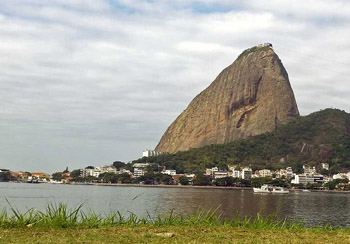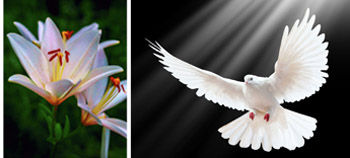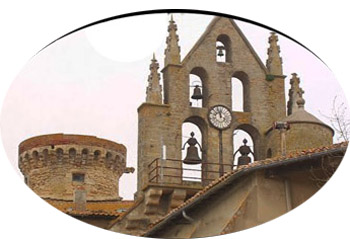Catholic Virtues
 |
 |
 |
 |
 |
 |
 |
True & False Paths to Happiness - XXVII
Catholics Should Make Exercises
of Transcendence
What is transcendence? How does one transcend? As explained in the previous articles, (here, here and
here) the search for the absolute consists in seeking in varied ways how creatures and things participate in the infinite perfections of God. Therefore, it is to seek something that transcends them.
And so, the questions arise: What is it to transcend? How does one transcend?
The focus of our attention will now be on this transcendence. That is, how to transcend the sensible and merely physical aspects of a being until we come to sense in it the Transcendent Being par excellence, that Being that transcends us infinitely, which is God.
The scale of transcendence
Imagine a particle of granite so small that its size can be compared to a grain of dust, and then suppose that the Pão de Açúcar (Sugar Loaf Mountain) is composed entirely of the same material. What would be the relationship between this tiny stone fragment and the Pão de Açúcar?
 It is the relationship of something insignificant to something else of the same nature that has an overwhelming quantitative disproportion. The mass of granite in the Pão de Açúcar is immense; the one that exists in the tiny particle, insignificant.
It is the relationship of something insignificant to something else of the same nature that has an overwhelming quantitative disproportion. The mass of granite in the Pão de Açúcar is immense; the one that exists in the tiny particle, insignificant.
With regard to quantity, the disproportion is colossal; however, regarding quality, there is no disproportion as both are made of the same material. There is a huge – but not transcendent – difference, since the Pão de Açúcar cannot be said to have a qualitative difference in matter from the small particle.
Going up the scale, a vegetable, whatever its type, transcends a stone, which has a mineral nature. And, just as a plant transcends a mineral, an animal transcends the plant. And man, a rational animal, transcends the simple animal.
Transcendence assumes the existence of a type of superiority of one thing over the other regarding the factor of quality.
However, certain analogies can be found in all categories. Consider, for example, purity on the ladder of transcendence. Besides the candor of a crystal, there is the purity of the lily which, as a being, transcends the crystal. Likewise, the purity of the dove transcends that of the lily, as it belongs to the animal kingdom. Finally, there is the purity of a man who, as a being, transcends the dove. The notion of purity is, therefore, analogously applicable to various beings.
 The same is true of the notion of distinction. The distinction existing in a pearl, a rose or a pheasant is different in each of these beings and is becoming more refined as it passes from one kingdom of nature to another. But superior to all of them is the distinction of a princess. Distinction is, therefore, an attribute that applies analogously to beings of different categories.
The same is true of the notion of distinction. The distinction existing in a pearl, a rose or a pheasant is different in each of these beings and is becoming more refined as it passes from one kingdom of nature to another. But superior to all of them is the distinction of a princess. Distinction is, therefore, an attribute that applies analogously to beings of different categories.
What if a crystal were able to think? It could imagine the existence of a being of a nature superior to its own. It would be able to know the purity of the lily, and it would understand what it has that is similar to itself, but it would be dazzled by the candor of the lily because, compared to itself, it is qualitatively much superior.
Likewise, if the lily were able to think, it would be enthusiastic to know the purity of the dove. And if the dove could reflect and know the purity of a human soul – as, for example, that of a St. Maria Goretti – he would be much more enthusiastic.
What is the reason for this? It is because the quality that a being possesses is realized in a creature of a higher category in a more eminent, fuller and more brilliant way, in another sphere of reality.
Exercises of transcendence
We depart, therefore, from the consideration that beings transcend one another and it is necessary to love this relationship: The plant transcends the stone, the animal transcends the plant, man transcends the animal; and in another sense of the word, one man can transcend another. Unimaginable, mysterious, unfathomable superiorities exist, and we must be enthusiastic about them.
 In life it is normal to see the ocean, a mountain, certain clouds or a very beautiful moonlit night. But these things can encompass great beauty and great values, to which man must pay attention for they have a latent meaning.
In life it is normal to see the ocean, a mountain, certain clouds or a very beautiful moonlit night. But these things can encompass great beauty and great values, to which man must pay attention for they have a latent meaning.
So it is that, in man, there is a kind of insatiable thirst for something ever more perfect, more elevated, more transcendent. He is able to envision through intelligence other worlds, realities, perfections and firmaments that he normally does not have before his eyes.
Hearing the sound of a bell, someone might consider it something routine, or even banal. But it is possible to transcend the mere sounding of the bell. Anyone who has ever heard a recording with the bells of the Abbey of Solesmes in France can hear in it all the aspirations for glory represented there, as well as all desires for intimacy, all the impulses for action, as all the yearnings for contemplation.
Every ideal of the fight receives an incentive in those bells, as does every yearning for peace. All the harmonic contraries of which the human soul is capable find, in these chimes, their expression.
 While one person might perceive only a beautiful sound, another would ascend to something that speaks of glory, action, contemplation, struggle or peace. That is, it transcends the mere sound.
A multitude of other objects lend themselves to a similar ascension. A simple garden tree can be an object suitable for a transcendent reflection.
While one person might perceive only a beautiful sound, another would ascend to something that speaks of glory, action, contemplation, struggle or peace. That is, it transcends the mere sound.
A multitude of other objects lend themselves to a similar ascension. A simple garden tree can be an object suitable for a transcendent reflection.
Looking at a certain tree, I can see what, according to reason, is good in it: lightness, elevation, elegance. Thus, my senses lead me to an act of love; from this I am led to desire eternal life, where I will see, face to face, in its ultimate perfection, unfathomable and eternal, the uncreated elegance, elevation and lightness.
Doing this, I would have made an exercise in transcendence.
Why would we call this progression upward transcendence? Because the created thing that was the object of my contemplation was transcended and I moved into something absolute.
I was able to reach the idea of an Absolute Being that has all perfections – therefore, also the lightness, elevation and elegance that we distinguish in a simple tree. That absolute Being is God.

Continued

And so, the questions arise: What is it to transcend? How does one transcend?
The focus of our attention will now be on this transcendence. That is, how to transcend the sensible and merely physical aspects of a being until we come to sense in it the Transcendent Being par excellence, that Being that transcends us infinitely, which is God.
The scale of transcendence
Imagine a particle of granite so small that its size can be compared to a grain of dust, and then suppose that the Pão de Açúcar (Sugar Loaf Mountain) is composed entirely of the same material. What would be the relationship between this tiny stone fragment and the Pão de Açúcar?

The massive granite mountain of Pão de Açúcar
in Rio de Janeiro
With regard to quantity, the disproportion is colossal; however, regarding quality, there is no disproportion as both are made of the same material. There is a huge – but not transcendent – difference, since the Pão de Açúcar cannot be said to have a qualitative difference in matter from the small particle.
Going up the scale, a vegetable, whatever its type, transcends a stone, which has a mineral nature. And, just as a plant transcends a mineral, an animal transcends the plant. And man, a rational animal, transcends the simple animal.
Transcendence assumes the existence of a type of superiority of one thing over the other regarding the factor of quality.
However, certain analogies can be found in all categories. Consider, for example, purity on the ladder of transcendence. Besides the candor of a crystal, there is the purity of the lily which, as a being, transcends the crystal. Likewise, the purity of the dove transcends that of the lily, as it belongs to the animal kingdom. Finally, there is the purity of a man who, as a being, transcends the dove. The notion of purity is, therefore, analogously applicable to various beings.

The lily & the dove, both symbols of purity but on different scales
What if a crystal were able to think? It could imagine the existence of a being of a nature superior to its own. It would be able to know the purity of the lily, and it would understand what it has that is similar to itself, but it would be dazzled by the candor of the lily because, compared to itself, it is qualitatively much superior.
Likewise, if the lily were able to think, it would be enthusiastic to know the purity of the dove. And if the dove could reflect and know the purity of a human soul – as, for example, that of a St. Maria Goretti – he would be much more enthusiastic.
What is the reason for this? It is because the quality that a being possesses is realized in a creature of a higher category in a more eminent, fuller and more brilliant way, in another sphere of reality.
Exercises of transcendence
We depart, therefore, from the consideration that beings transcend one another and it is necessary to love this relationship: The plant transcends the stone, the animal transcends the plant, man transcends the animal; and in another sense of the word, one man can transcend another. Unimaginable, mysterious, unfathomable superiorities exist, and we must be enthusiastic about them.

Contemplating the night clouds
can be an exercise in transcendence
So it is that, in man, there is a kind of insatiable thirst for something ever more perfect, more elevated, more transcendent. He is able to envision through intelligence other worlds, realities, perfections and firmaments that he normally does not have before his eyes.
Hearing the sound of a bell, someone might consider it something routine, or even banal. But it is possible to transcend the mere sounding of the bell. Anyone who has ever heard a recording with the bells of the Abbey of Solesmes in France can hear in it all the aspirations for glory represented there, as well as all desires for intimacy, all the impulses for action, as all the yearnings for contemplation.
Every ideal of the fight receives an incentive in those bells, as does every yearning for peace. All the harmonic contraries of which the human soul is capable find, in these chimes, their expression.

Seeking what is transcendent in a splendorous oak
Looking at a certain tree, I can see what, according to reason, is good in it: lightness, elevation, elegance. Thus, my senses lead me to an act of love; from this I am led to desire eternal life, where I will see, face to face, in its ultimate perfection, unfathomable and eternal, the uncreated elegance, elevation and lightness.
Doing this, I would have made an exercise in transcendence.
Why would we call this progression upward transcendence? Because the created thing that was the object of my contemplation was transcended and I moved into something absolute.
I was able to reach the idea of an Absolute Being that has all perfections – therefore, also the lightness, elevation and elegance that we distinguish in a simple tree. That absolute Being is God.

The chiming of bells can awake certain sensations in a man that cause him to transcend
Continued

Posted April 21, 2021





